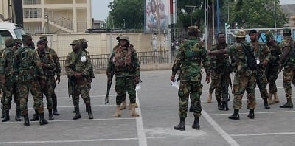 Some officers of the Ghana Armed Forces
Some officers of the Ghana Armed Forces
Dominic Nitiwul, the Minister of Defence, has urged the country's political leadership not to drag the military into party politics or incite the population against it.
In his remarks at the Republic Day lecture, he noted that some people believe the military could be targeted or used for personal or group ulterior motives.
The lecture, organized by the Ghana Armed Forces Command and Staff College (GAFCSC) in conjunction with the One Ghana Movement at Teshie in Accra, was themed "Reflections on the Democratic Control Over the Military: A Way Forward for Sustainability."
He expressed concern that due to a lack of knowledge about the activities, functions, and purpose of the military, people say all manner of things, which should be avoided at all costs to prevent a national breakdown.
"Don't weaken the military by making people not fear it, because if it is weakened to the extent that people don't fear your military, our nation would crash," he said.
Nitiwul called for a "fine line" between the civil-military relationship and military conduct, asserting that such a relationship should be a well-defined balance between the two to strengthen the country's democratic process and progress.
"There is a fine line between how we relate with the military and how we want them to behave.
"So, if there is a public disturbance to the extent that the police call in the military and people say we are not going to leave but will face the military, then what will we do? Should the military also run away?
"Should they control the people by using brute minimum force? Would the military be taken to task because they use brute minimum force? These are some of the things we need to address to shape our culture as a country," he said.
He stressed that the military should not be dragged into the affairs of any political party, whether in power or in opposition, because their duty is to defend and guard the country's democratic political process, regardless of whatever happens.
He mentioned that "some of the brainiest and most talented people" in the country are embedded in the military and thus need to be fully utilized to enhance the military's participation and confidence in the democratic governance system and process.
The GAFCSC-One Ghana Movement Republic Day lectures featured Francis Poku (Esq.), a former National Security Minister, who highlighted the importance of civil control of the military during his lecture on the same topic.
He explained how political authority could effectively use the constitution to do so, how the country could utilize them to strengthen the country's democratic governance and system, and their critical role in ensuring peace, security, and handling of subregional threats.
He made recommendations to enhance civil-military cooperation for economic and political stability in the country. Poku was supported by Professor Kwesi Anning, a security expert, and Madam Josephine Nkrumah, the Economic Community for West African States (ECOWAS) Commissioner to Liberia, who reinforced his assertions and recommendations.